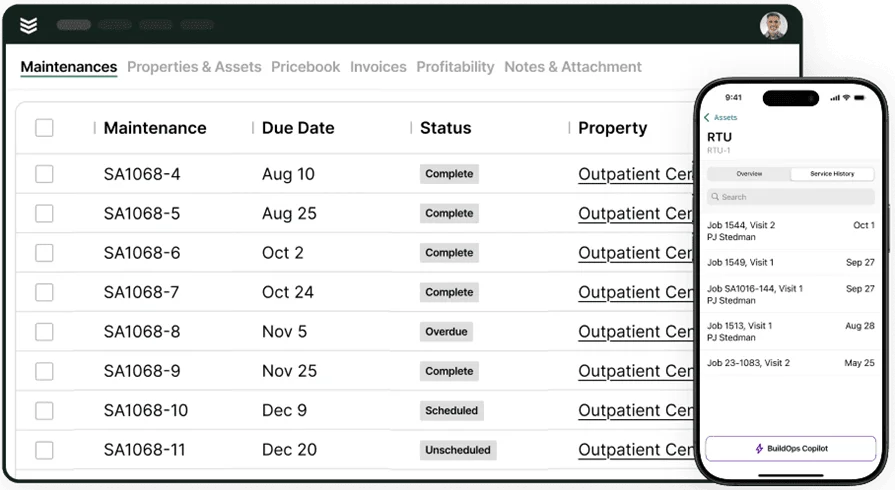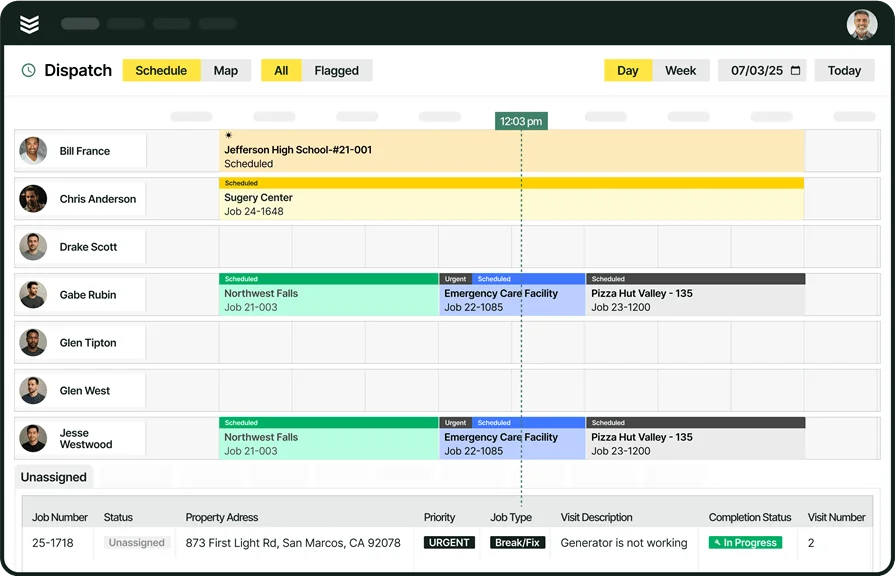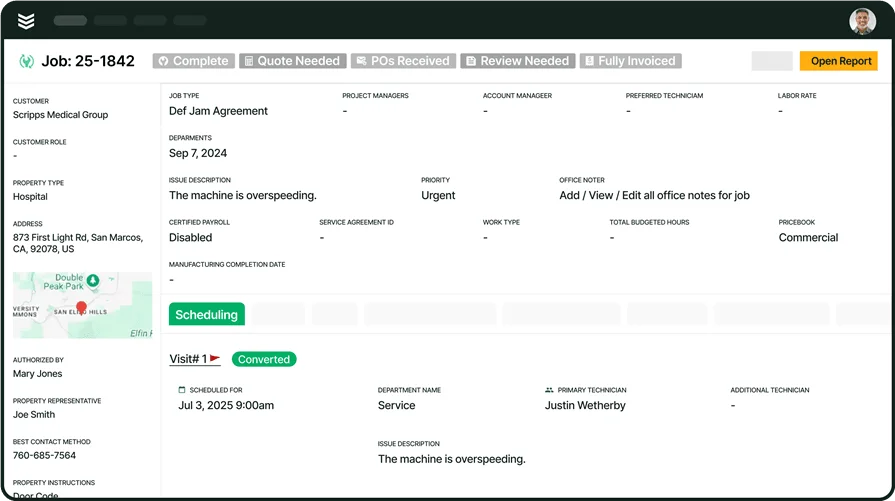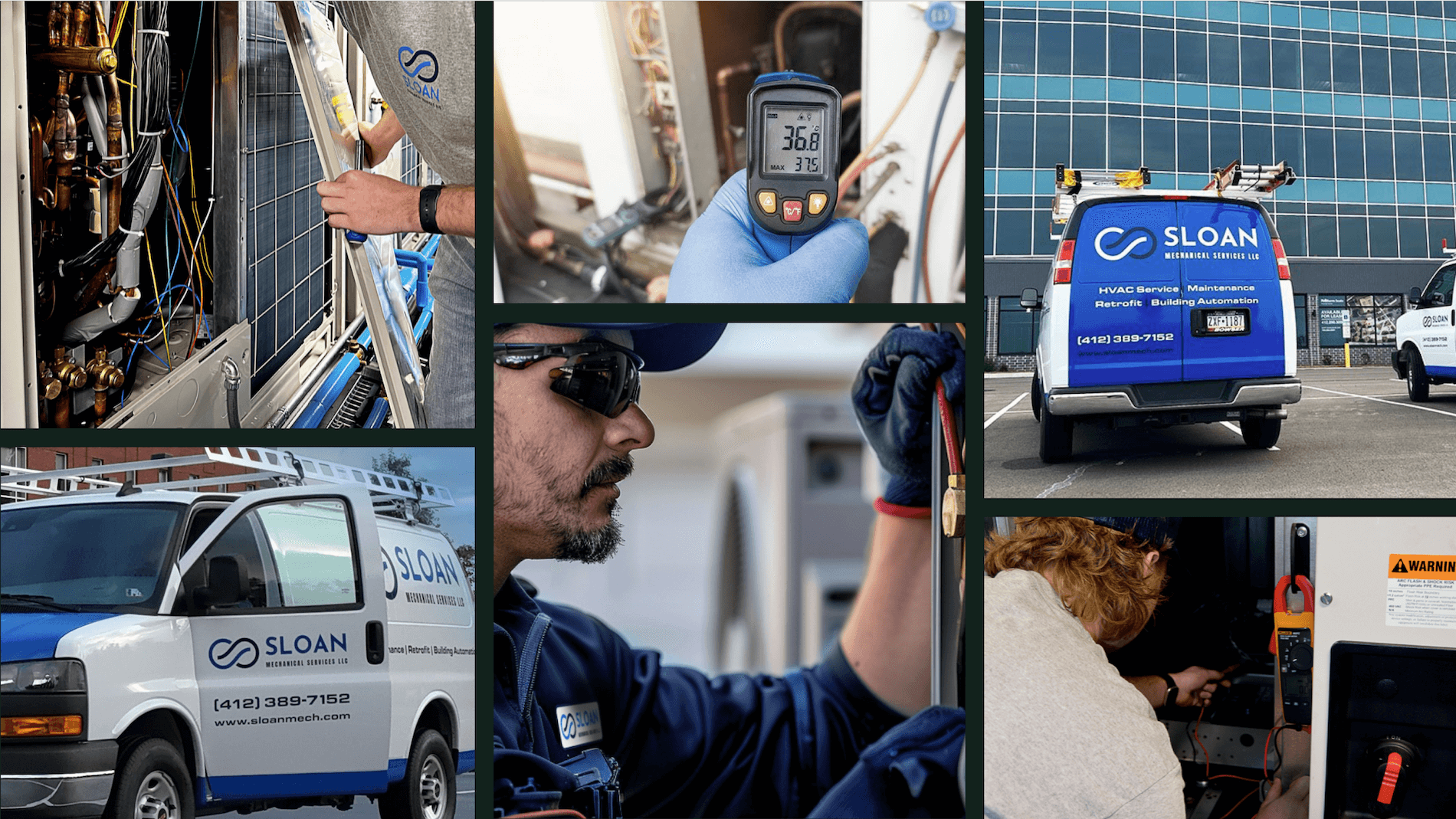When your business relies on HVAC systems to keep everything running, breakdowns don’t just throw off the temperature—they throw off your schedule, too. That’s why service agreements matter. These contracts keep systems maintained, reduce emergency calls, and help HVAC businesses lock in repeat revenue.
Whether you’re building your first service agreement or tightening up your current contracts, this guide walks you through the essentials—what to include, the perks for your clients and your crew, and tools to make the process easier. If you're new to the HVAC industry or exploring software built for it, this is a solid place to start.
Here’s what we’ll cover:
- What is an HVAC service agreement contract?
- 7 benefits of HVAC service maintenance agreements
- What to include in an HVAC service agreement contract
- 10 best HVAC service agreement templates
No two service agreements look exactly alike—but the best ones share a few critical parts. Let’s start by breaking down what an HVAC service agreement contract really is, how it works, and why it’s become a go-to move for contractors who want to secure steady income and happier clients.
What is an HVAC service agreement contract?
An HVAC service agreement is a written contract between a customer and an HVAC contractor that outlines ongoing HVAC services—like inspections, tune-ups, maintenance & repairs, and priority response. These agreements help reduce downtime, control costs, and keep systems performing at their best.
Think of it as a maintenance membership. Instead of waiting for something to go wrong, these agreements keep HVAC systems in check through scheduled inspections, cleanings, and tune-ups. For contractors, it's a way to lock in recurring work. For customers, it’s peace of mind and fewer surprises. These agreements can be tailored to commercial or residential clients depending on system type, usage, and budget.
Common HVAC services included in a maintenance contract
Service agreements lay out real, boots-on-the-ground work. They set expectations around the tasks techs will handle throughout the year—everything from checking refrigerant to swapping out worn parts. Most agreements bundle four core service types: inspections, tune-ups, ongoing maintenance and repairs, and fast-tracked response when things go sideways. Here’s what that typically includes:
- System inspections: These are deep dives into HVAC units to catch problems early. Techs check refrigerant levels, examine coils and condensers, test airflow, inspect ductwork for leaks, and assess overall system performance.
- Seasonal tune-ups: Ahead of summer or winter, contractors prep the system for heavier use. That includes tightening electrical connections, adjusting belts, calibrating thermostats, testing safety controls, and verifying system startup and shutdown cycles.
- Filter changes and coil cleanings: Dirty filters kill efficiency. Regular replacements and coil cleanings help the system breathe better, keep energy bills in check, and reduce wear on motors and fans.
- Component lubrication and part testing: Moving parts like motors, bearings, and fan blades get lubrication to reduce friction. Techs also test electrical components—like capacitors and contactors—to make sure everything runs safely.
- Minor repairs and adjustments: If a worn part needs replacing or a loose wire turns up during inspection, it gets handled on the spot. These small fixes prevent bigger issues down the line and reduce emergency calls.
- Priority scheduling for breakdowns: If something fails mid-season, clients under agreement jump the line. Most agreements guarantee same-day or next-day service to keep comfort systems running with minimal downtime.
The services are only part of the value. For contractors and customers alike, these agreements offer some big-picture benefits—ones that impact reliability, cost, and long-term system health. Let’s break down exactly why they matter.
7 benefits of HVAC service maintenance agreements
Service maintenance agreements help HVAC businesses stay consistent while giving customers fewer surprises. These contracts build trust, keep revenue flowing, and ensure systems stay in top shape. Whether you're running commercial jobs or residential service calls, the benefits stack up fast when these agreements are in place.
1. Fewer Emergency Repairs
Well-maintained HVAC systems are far less likely to crash during a heatwave or cold snap. Regular inspections and small fixes—like tightening connections or topping off refrigerant—cut down on surprise breakdowns. Fewer emergencies mean fewer panicked calls and less stress on your crew.
2. Predictable, Recurring Revenue
Service agreements give your business a reliable income stream. Instead of waiting for one-time installs or seasonal spikes, you can count on steady payments throughout the year. This stabilizes your cash flow and helps with long-term planning. For commercial contractors, commercial HVAC service agreement strategies can help lock in bigger accounts with multi-site needs.

Superpower your service agreements
Keep your customers happy so service agreements run smoothly and remain intact.
3. Extended Equipment Lifespan
HVAC units that get consistent care run longer and break down less. When coils are clean, motors are lubricated, and parts get replaced before failure, the whole system performs better. That means fewer replacements, fewer callbacks, and a reputation for helping your clients get the most from their investment.
4. Stronger Customer Relationships
Consistent service creates familiarity. Your techs become the go-to experts, not another face in a truck. Repeat visits lead to more trust, and that trust turns into renewals, referrals, and upsell opportunities. To keep that connection tight, HVAC field service management tools make it easier to track history, schedule visits, and stay responsive.
5. Improved Energy Efficiency
A tuned system doesn’t have to work as hard. Routine service keeps components clean and airflow balanced, which means better performance and lower energy bills. For customers, that’s savings. For your business, it’s proof that your team adds value beyond basic repairs.
6. Priority Scheduling During Peak Times
When systems fail during extreme weather, wait times can stretch for days. Service agreement customers move to the front of the line. This perk adds major value for clients and helps your team plan schedules with fewer fire drills.
7. Competitive Edge in the Market
Plenty of HVAC companies offer installs and repairs. Fewer offer bundled service agreements that combine value, speed, and consistency. If you're looking to scale that side of your business, HVAC service agreement software helps you sell, manage, and track contracts without adding extra admin work.

Get the HVAC Growth Report
Explore how leading HVAC businesses achieve meaningful, long-lasting growth.
What to include in an HVAC service agreement contract
A service agreement works best when every detail is spelled out. It should explain what’s covered, how often service is delivered, and what both sides are responsible for. Clear terms protect your business and build trust with customers, especially when expectations match the work being done.
- Scope of Services: Define exactly what tasks are included—such as inspections, filter replacements, coil cleanings, emergency calls, or system tune-ups. This keeps the agreement focused and prevents misunderstandings about what your techs will handle during a visit.
- Service Frequency: Outline how often your team will visit the property. Whether it’s quarterly, twice a year, or customized by equipment type, setting a schedule upfront helps clients plan around your team and keeps maintenance consistent.
- Response Time Guarantees: If priority service is part of the deal, lock in the turnaround time. Stating that agreement customers get 24-hour or same-day response during breakdowns adds clear value and sets your business apart.
- Payment Terms and Pricing: Lay out costs, billing cycles (monthly, annually), and payment methods. Spell out whether repairs are discounted or if parts and labor outside the agreement come with added charges.
- Contract Length and Renewal: Every agreement needs a clear start and end date. Include terms for renewal—whether it’s auto-renewed, manually extended, or reviewed annually. This keeps things organized and avoids missed service windows.
- Cancellation Policy: If a client wants to end the agreement early, this clause explains how it works. Outline notice periods, refund eligibility, and any applicable fees to avoid billing issues later.
- Equipment Covered: Identify what systems the contract applies to—rooftop units, heat pumps, chillers, etc. If the client has multiple locations or system types, this section keeps your techs aligned with what they’re servicing.
- Customer Responsibilities: List any client tasks, like ensuring access to units or changing filters between visits. This keeps the service efficient and sets a collaborative tone.
- Contact and Emergency Info: Include key contact details for both sides—service coordinators, site managers, or after-hours numbers. This makes sure issues get addressed fast without confusion.
A well-written agreement sets the tone for everything that follows. Before you send it off, make sure each part answers the same question: What exactly are we agreeing to?
10 best HVAC service agreement templates
Finding the right HVAC service agreement template can save your team hours—and prevent headaches down the road. Whether you're a commercial contractor managing multi-site clients or a residential shop looking to lock in repeat service, the right template keeps expectations clear and work consistent. Below are ten trusted options, each with unique strengths, format types, and ideal use cases. We break them down so you can pick what fits your business best.
1. BuildOps
BuildOps offers a fully integrated HVAC service agreement tool made specifically for commercial contractors. It doesn’t stop at the template—it ties your contracts directly into your scheduling, asset tracking, invoicing, and dispatch workflows. Agreements can be customized per client, tracked over time, and automatically renewed with built-in alerts. It’s designed to support multi-site, multi-asset commercial work, with tools built for handling complex service scopes and layered client requirements.
Template Format: Software (part of the BuildOps platform)
Cost: Custom pricing based on team size and service scope
Most Useful For: Commercial HVAC contractors managing multiple clients or locations

See BuildOps in action
See how HVAC contracts connect with dispatch, billing, and asset history.
2. FieldEdge
FieldEdge offers a downloadable HVAC service agreement template as part of its field service management software. The template itself is basic but gives a decent starting point for standard residential agreements. FieldEdge’s software does offer recurring billing, maintenance contract tracking, and scheduling reminders, but it's better suited for smaller teams with less customization needs. If you're looking for deep reporting or detailed client histories across sites, the platform may fall short compared to more robust options like BuildOps.
Template Format: Downloadable Word / PDF + built-in contract tools in software
Cost: Template is free; software requires a paid subscription (contact for pricing)
Most Useful For: Small residential service companies or first-time agreement builders
Looking for a basic template to kick things off? Grab FieldEdge’s HVAC agreement template here.
3. Housecall Pro
Housecall Pro offers a free, editable HVAC service agreement template designed for home service pros. It’s ideal for residential HVAC businesses who want something fast, clean, and customizable without diving into a full software platform right away. The template is simple—covering service frequency, included tasks, and pricing—and pairs well with their broader software features like invoicing, text alerts, and online scheduling. While great for small teams, it doesn’t offer the contract depth or commercial workflows needed for larger jobs or clients.
Template Format: PDF / Editable Word
Cost: Free
Most Useful For: Residential HVAC teams needing a plug-and-play document
Need a no-fuss agreement you can brand and send today? Download Housecall Pro’s HVAC service agreement template. You can also compare Housecall Pro’s features with BuildOps features right here if you want to see how they stack up.
4. Jobber
Jobber provides service agreement tools inside its field service software, along with customizable templates. It’s focused on simplicity—ideal for smaller HVAC shops handling recurring residential work. You can set up recurring visits, automate follow-ups, and store agreement details for each client. However, the system isn't built for commercial complexities like asset management or multi-location hierarchy, which makes it a tighter fit for teams scaling into larger projects.
Template Format: Built-in software templates + scheduling automation
Cost: Starts at $69/month (Core plan); templates included
Most Useful For: Residential HVAC businesses with recurring maintenance
Want a lightweight way to build and manage service agreements? Explore how Jobber’s HVAC software handles service agreements.
5. ZenTrades (ZenHVAC)
ZenHVAC by ZenTrades gives HVAC contractors access to a full library of editable service agreement templates built specifically for residential and commercial use. The templates cover visit frequency, included services, terms, and pricing—plus they’re designed for fast customization with your logo, client details, and optional upsells. You can use the templates on their own or pair them with ZenHVAC’s service tools for quoting, tracking renewals, and converting agreements into live schedules. While the template options are strong, the software itself is more tailored for smaller shops, and may not support more advanced workflows or commercial asset tracking.
Template Format: Editable Word and PDF
Cost: Free templates; paid plans for software features
Most Useful For: Small to mid-size HVAC contractors looking for ready-to-use templates and lightweight digital tools
Want editable templates built specifically for HVAC? Browse ZenHVAC’s service agreement toolkit.
6. Service Fusion
Service Fusion’s HVAC platform includes service agreement tools built into its job management system. You can set up recurring maintenance schedules, track agreement history, and create reminders for upcoming visits. It’s well-suited for contractors who already use the software for dispatching and invoicing. But for teams that need deep customization, complex workflows, or commercial asset management, it may feel limited.
Template Format: Software-based (within platform)
Cost: Subscription required; pricing by request
Most Useful For: HVAC teams already using Service Fusion for general operations
Want to see how agreements tie into Service Fusion’s full platform? Explore their HVAC service software.
7. ThermoGrid
ThermoGrid is built for HVAC contractors who want to manage service agreements inside a larger dispatch and billing platform. You can customize contract terms, set up recurring visits, and manage reminders inside the same system you use for estimates and payments. While powerful for residential teams, it’s not geared toward complex commercial requirements or large multi-site clients.
Template Format: Software-based (inside platform)
Cost: Subscription required; contact for pricing
Most Useful For: Residential HVAC contractors with recurring clients
Looking for an HVAC platform that includes built-in agreement tools? Check out ThermoGrid’s service management system.
8. PandaDoc
PandaDoc offers a customizable HVAC service agreement template that works well for contractors who want a polished, digital form they can send and sign online. You can edit terms, add branding, and use their e-signature feature to finalize agreements quickly. While flexible, it’s not an HVAC-specific tool—so it doesn’t include scheduling, dispatch, or service history tracking.
Template Format: Digital (editable online)
Cost: Free to download; paid plans for software use
Most Useful For: Teams needing quick, professional-looking contracts without extra features
Want a clean, digital contract you can edit and send? Use PandaDoc’s free HVAC service agreement template.
9. LuminPDF
LuminPDF offers a fillable HVAC service contract template that’s simple, clean, and easy to complete online. It includes fields for client and contractor details, scope of services, maintenance schedules, payment terms, and signatures. The form can be edited directly in-browser and saved as a PDF for easy sharing. It’s a solid option for solo contractors or small teams who want a fast, no-fuss way to send out basic service agreements. However, it lacks integration with dispatching, invoicing, or contract tracking tools—so it’s best for one-off use or manual workflows.
Template Format: Fillable online PDF
Cost: Free
Most Useful For: Small HVAC shops needing a quick, editable contract they can send today
Need a fillable HVAC agreement you can edit and download in minutes? Use LuminPDF’s HVAC service contract template.
10. ServiceBox
ServiceBox is a maintenance-focused platform that supports recurring HVAC service contracts through automation. You can create service agreements tied to equipment, set recurring work orders, and assign tasks based on intervals or service types. It also sends renewal alerts and integrates with scheduling and invoicing features. While powerful for managing ongoing maintenance, it's not built for complex multi-location commercial service, and customization options can be limited depending on contract type.
Template Format: Software-based (service contract automation)
Cost: Subscription required; pricing based on number of users
Most Useful For: HVAC contractors focused on preventative maintenance and recurring residential clients
Want a system that automates recurring work tied to service contracts? Explore ServiceBox’s HVAC preventative maintenance tools.
Wrapping up, HVAC service agreements aren’t just good business—they’re essential for staying organized, delivering consistent value, and building trust with your customers. Whether you're handling a few homes or managing contracts across dozens of properties, having the best HVAC management software can make a difference in how you manage your operations.
The truth is, many of the features outlined in this guide—automated renewals, asset tracking, service history, real-time scheduling—aren’t standard in most tools. For commercial contractors looking to run tight, repeatable operations, an all-in-one platform makes that possible without the patchwork.

Take a closer look at BuildOps
We help HVAC teams land—and manage—recurring service agreements.








